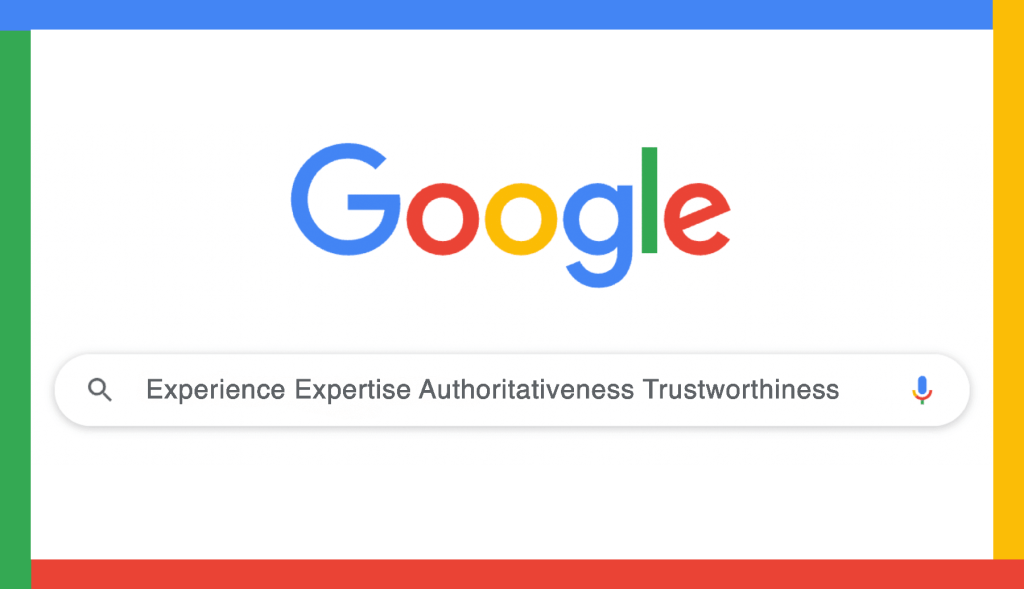UPDATED JUNE 29, 2025
AI is changing the way we search online
AI-powered search is different to what we’ve been used to, so now is a good time to understand more about what this means for your SEO and your website and blog content.

At the time of writing, AI-powered search is still pretty new and we’re still learning. The information here is based on what we know so far and what we’re presuming will be the best way forward.
The more I learn, the more I’ll add.
But before we get into that, you’d probably like to understand more about AI-powered search and how it works.
How does AI-powered search work?
AI-powered search uses the power of AI to enhance your internet search experience. But you’ve probably already guessed that bit — duh! So how does it work and how is it different to a traditional search?
Searching using traditional search engines
When you use a more traditional search engine, you have to start each new search from scratch. You type your search query, Google returns its list of results and you, hopefully, find what you were looking for.
If you don’t get exactly what you wanted, you need to go back to the beginning and rephrase your original search, giving more context or adding more detail.
If you do get what you were looking for and want to move onto the next phase of your search, you need to start afresh and put a whole new search into Google.
It’s just a whole lotta starting over.
Searching with AI
With AI-powered search, you can have conversations with your search engine, much like you can with ChatGPT. Although, I sincerely hope your conversations with ChatGPT aren’t as irritating as mine.
Rather than starting a new search each time, AI remembers your conversation and allow you to ask follow-up questions that will help you expand or narrow down your search.
Along with enhanced features, like voice search, personalised search and automatic query completion, this conversational approach is designed to be more intuitive and should help you find what you’re looking for more quickly and easily than ever.
How does AI-powered search work?
Instead of relying on traditional keyword matching, AI-powered search uses more advanced algorithms and techniques to understand what we’re looking for and why.
Let’s have a look at some of those.
Natural Language Processing (NLP)
NLP helps AI to understand queries made using conversational language. It helps to recognise context, implied meanings and the relationships between words.
Semantics
Rather than relying on exact keyword matches, AI uses semantic understanding to figure out the intent behind search queries. By understanding your goal, it will give you the most relevant matches, even when those matches use different wording to your search.
Even if your search query is multilayered, or ambiguous, AI should still be able to figure out what you need and return the correct results.
Personalised search
Personalised search gives AI access to your emails, search history, online activity, shopping preferences, streaming preferences, posts you’ve liked and accounts you follow.
Some might say that’s intrusive — I know I would. But in exchange for all that data, AI will anticipate and answer every question you might have on a particular topic.
This is said to be so accurate that if you and I both researched the same topic, we’d get vastly different results.
Freaky huh?
If you’re like me, and this makes you uncomfortable in a “Big Brother is watching you” kinda way, you’ll be pleased to know there’s a way to disable it.
How does AI-powered search deliver search results?
AI-powered search answers more queries in the search engine interface itself.
Traditional Google would give you a short, featured snippet answer, from one source. But AI gives you a more detailed answer, which may pull information from a number of different sources. This appears at the top of the search engine results page (SERP), in what we call position zero.
Originally, it was thought AI would compile these answers without giving any credit. But, as it turns out, it does feature a list of its sources, with links. So, maybe it’s not all bad.
Oh, who am I kidding?!
You still have to be careful with the information given in the AI summary. Because AI still isn’t too hot on checking its sources — and it still can’t tell a credible source from a crap one. Mmmkay?
Does SEO still matter for AI-powered search?
Yes. For all those who keep proclaiming SEO is dead — *eyeroll* — I have news. SEO-optimised content is still important in the age of AI-powered search.
According to data collected by Ziptie, traditional search still has the biggest influence on the AI overview.
This data shows that:
- If your website ranks first in Google’s traditional results , you have a 25% chance of being used as a source in AI overviews
- The higher you rank in Google’s top 10, the more likely you are to appear in AI search results across the main AI platforms.
So, yes, SEO still matters, but it’s evolving, just like it always has, and you still need to keep up.
How to future-proof your content
When I first wrote this article, in January 2024, a lot of the advice here was speculative. AI-powered search was an emerging technology and we could only make presumptions about how to write for it, based on what we’d seen.
But now AI search is becoming more commonplace and we have some actual data to work with. Woohoo!
Are ya excited? Are ya?!

Here’s what we know so far about adapting and creating SEO content for the age of AI-powered search.
Creating content for AI-powered search
Answer questions directly
AI-powered search looks for the best and most relevant answer to a user’s search query. So focus on creating genuinely useful content that gives direct answers to users’ questions.
The Q&A format, which became popular with the arrival of voice search, is still a good format to follow.
Write in plain English and prioritise being clear over being clever, so AI can understand you and is in no doubt about what your content is saying.
Yeah, I know, you should be doing this anyway. But it’s even more important now.
Give summarised, then thorough answers
To create its overview, AI looks for results that give the best short answer to the user’s question. This might be in the form of a summary introduction, summarised bullet points or key takeaways.
Follow up your summary with as much detail as is necessary. This will include anticipating further questions that might arise from the original question and answering those, too.
For some searches, the summarised answer in the AI overview may be enough to satisfy the user. If that’s the case, it will count as a zero-click search and you won’t see any traffic.
But if the user wants somewhere else to go for more detailed information, AI will prioritise results that provide the most relevant and comprehensive content on the subject.
Structure your data
Make your content scannable and searchable with a clear and readable structure. Because structured data is easier for AI to read and understand what it’s looking at.
Aim to structure your content into self-contained blocks with clear, relevant headings and complete ideas. This will mean AI can retrieve and use a whole block rather than assembling blocks from different sources.
Some elements will be identified by schema markup in the coding. And some will come from on-page elements such as title tags, meta data, optimised headings and image alt text.
When AI is searching on behalf of a user, it’s capable of pulling together a lot of information quickly, so make sure any key information is readily available. I’m talking about things like pricing, services, policies, star ratings etc.
Format your content for the web
Internet users are impatient, so AI will look for answers it can pull together quickly and easily.
Like traditional search engines, AI handles written information best when it’s formatted correctly, so pay attention to your formatting.
Tips to aid this process include:
- Splitting your content into easily consumable sections
- Introducing each section with a relevant heading
- Using your website/blog’s SEO heading hierarchy correctly
- Writing your lists in bullet point form, like this!
Using expert and varied formatting will also give a good page experience and increase user engagement.
Optimise for search intent
AI-powered search is focused on understanding what users are looking for and why, so it can return the most relevant results for each query. To stand the best chance of featuring in those results, you need to optimise for search intent.
You can get good idea of what the search intent of a keyphrase might be from Google’s search-engine results pages (SERPs). But you can also optimise proactively for search intent — and here are two ways to do that:
- Include conversational introductions to queries, like, I want to buy…, How can I prepare for…?, What should I do if…? to give more context
- Use Calls to Action (CTAs) that reflect user intent, like, enquire, browse, buy, book, schedule, get a quote.
Optimise for semantic search
Rather than focusing on keyword repetition, focus on rephrasing instead.
Use synonyms (equivalent wording) and alternative phrasing to cover a broader keyword base and give your content more chances to be picked up.
Give as much context as you can
With conversational searching, users can be much more specific about what they want to see and their searches may have several layers.
Rather than optimising for a base phrase, like, clubbing outfits, go further. For example, plus-size clubwear for body-confident 20+ women who like to dance.
Write with NLP in mind
Natural Language Processing (NLP) is how AI is trained to understand the context and meaning of written and spoken words. It will use this in search to determine why a user is searching and what they want to see.
To make sense of each search query, AI will look for and recognise:
- Individual words and their context
- Use the right words for the job
- Be as clear and specific as you can
- Grammatical tags, such as nouns, verbs and adjectives
- Names, places, organisations
- Capitalise first letters, where necessary
- Write out acronyms and abbreviations at least once for specificity
- Sentiment, whether that’s positive, negative or neutral
- Sentence structures
- Keep them simple and easy to read
- Search intent — what the user is expecting to see.
Of course, if you’re writing for your audience — and not for the search engines — you’re probably writing with NLP in mind already.
Create original content

Original articles have more value than articles that assemble information from other sources. So work on creating original content that’s unique to your brand and will demonstrate your particular expertise and experience.
That could include content like:
- Original research, like customer surveys and interviews
- Stories and case studies that show your experience
- Q&As with experienced people in your business.
Go deep with your content

When Google first introduced the featured snippet, it led to a rise in zero-click searches, because people had their answer without clicking through to a website. AI overviews are compounding that, making it even harder to get those clicks back to your website.
If you have shallow content that answers basic questions, it will soon become redundant — if it hasn’t already.
You can still answer basic questions in your content, if you need them for your audience’s benefit. But to optimise your click-through rate (CTR), it’s better to focus on creating more extensive articles that answer more/wider questions in a more in-depth way.
Work to build topic authority in your niche
With AI-powered search, your content will rank for your understanding of the topic rather than just keywords.
AI’s Large Language Models (LLMs) are drawn to what they see as reliable, authentic and authoritative content. So take relevant topics and cover them thoroughly and in detail, including related topics and sub-topics.
You could do this in the form of a content hub, with the main topic splitting into multiple branches and avenues of exploration. The goal is to anticipate and answer every question your audience might have and become a go-to source of information on that topic.
Include things like case studies, customer stories and original insights, which are unique to you and harder to copy.
Aside from helping you in AI-powered search, this approach will give your prospects the confidence to choose you and to know they’ll be in safe hands.
Give AI the confidence to choose your content
Apparently, AI’s Large Language Models (LLMs) favour content that seems reliable. Personally, I haven’t seen any evidence of this yet, but I have everything crossed.
So how do you satisfy that?
Use confident and authoritative language, because this will give AI the confidence that what you’re saying is correct. Use clear references and specific language wherever possible.
Use supporting evidence to give weight and credibility to your claims. This might be in the form of statistics, charts, graphs or examples. To help AI, put the evidence close to the claim it’s supporting. Links should appear in the same paragraph, images should appear directly afterwards.
General advice
Follow SEO best practice
In the era of AI-powered search, the basics of SEO best practice will still apply.
This includes things like:
- Fast loading
- Robust security
- Good technical SEO
- High quality backlinks
- Responsive, mobile-friendly web design.
Essentially, everything that makes your website fast, secure and functional.
Work on your internal linking
Use internal linking to help show AI the relationships between your web pages and blog articles.
Links showing helpful related content will help AI understand your website more holistically and enable site-wide content retrieval.
Demonstrate E-E-A-T
It’s thought that E-E-A-T, as defined in Google’s Quality Rater Guidelines, will still be used to rate businesses and rank websites. So this will remain an important guideline to follow.
If you’re not familiar, it stands for Experience, Expertise, Authoritativeness and Trustworthiness. Four things your website and content should be exhibiting.
Focus on the user experience
AI-powered search is all about enhancing and enriching the user experience. So it figures, your content should do the same. The best content writers have prioritised users over search engines for a long time, but now this will be even more important.
Write for humans, optimise for search engines — always.
Use AI to find areas for improvement
The beauty of AI is that you can ask it to assess your site for you, as it would if it were searching.
And it can report back on things like missing information, inconsistencies and difficult phrasing. Giving you the opportunity to put things right and giving your website the best chance of success.
Track the metrics that matter
Surface clicks only give surface level information, so you need to go deeper.
Start asking questions like:
- How engaged are your visitors?
- How many pages are they viewing?
- How far are they scrolling down your pages?
- How long are they spending on your site?
- Are they returning multiple times?
Audit your content regularly
Thanks to AI, new content is being created and published at incredible speed. This means it’s more important than ever to audit your content regularly.
Your content should:
- Be current and relevant
- Be optimised effectively
- Address all the key issues
- Satisfy your ideal customers’ needs
- Compete effectively with similar content.
Credits
This article was originally published in January 2024. In the 2025 update, the advice has been augmented with help from the following sources:
https://ziptie.dev/blog/seo-still-matters-for-ai-search-engines
https://searchengineland.com/generative-ai-powered-stack-456079
https://ipullrank.com/ai-mode-and-personal-context-google-io
Looking for a future-ready content writer?
Allow me to introduce myself!
I’m Jenny Lucas, a freelance copywriter and content writer based in Leicester, UK.
If you need strategic, high-performing website copy and blog content that will show up on Google and help you attract more of your ideal customers, maybe I can help.
For the last 15 years I’ve been specialising in SEO copy and content that’s helped my employer, my clients — and myself — to attract new business and succeed online.
So if you need SEO-optimised website copy or blog content, I’d love to hear from you.
Learn more about SEO website copywriting >>
Learn more about SEO content writing >>
Find out more about working with me >>

You might also like…

Writing for the web? Here’s how to format your copy and content so it gets read >>


